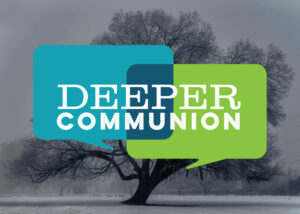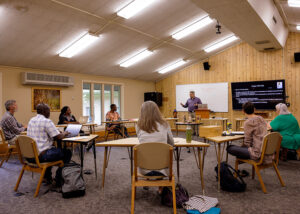During a Mennonite Church gathering in Charlotte, North Carolina, some years ago, I decided to go to a local restaurant for lunch. I left my name tag and swag bag behind so that I would look less vulnerable to thieves, but I was so successful at hiding my foreign identity that I attracted another kind of unwanted attention. As I walked back, I was approached by two people, one holding a video camera and one with a microphone. They had a question about local politics and were canvassing regular people on the streets for their opinions. They were disappointed to find that I had no opinions. I’m vain enough that I liked the idea of being on TV, but I couldn’t even pretend to have something worthwhile to say.
For a long time that largely described my approach to politics. While I grew up with an interest in politics, even buying a membership in my party of choice, the more I learned about the Kingdom of Heaven and the church’s place in the world, the less I was interested in partisan loyalties. I would go on, in my travels and studies, to cross paths with Christians with more liberal politics than mine and Christians with more conservative politics than mine. That Kingdom mindset allowed me to value these people, admire their faith, and learn from them. Another win for neutrality.
But then, as I observed and experienced injustice, and learned from victim advocates, I started to see a broader picture. I know that neutrality is a high virtue for many peace-minded Mennonite Christians, so if anyone reading feels that way, allow me to offer the following challenges:
God hates neutrality. The prohibition against being lukewarm (Rev. 3:16) can apply to justice and inter-personal conflict just as much as evangelistic fervour.
Neutrality is lazy. It is easy to wash our hands of a conflict and assume the best intentions of everyone involved. It is hard work to discover which rights are being violated, which power is being abused, and which vulnerabilities are being exposed, but that work is necessary.
Jesus wasn’t neutral. Despite all the things Jesus said about peace and love, he never stepped into a conflict situation and preached neutrality. He didn’t always choose the side we would choose or the one we would expect him to pick, but Jesus chose sides.
Only monsters appreciate neutrality. Holocaust survivor Elie Wiesel said, “Neutrality helps the oppressor, never the victim.” Many of us like to be thanked for our work, but if your involvement largely constitutes being neutral, the only one who will ever thank you is someone whose unjust actions are hidden or validated by your neutral stance.
Neutrality is a privilege. Neutrality is a choice available to the unaffected, the unafflicted and the uninvested. Victims and the people closest to them don’t have the luxury of choosing to be neutral.
My new friends with the TV camera and microphone didn’t have time to explain the issue of the day to me, and I had to get back to my conference. I’m sure if I had studied the relevant information, I would have formulated an opinion, maybe even one worthy of a TV interview. My experiences and convictions (like we all have) would have led me to choose a side. Yes, we can hold those loyalties lightly. Yes, we can defend our side without resorting to violence. But injustices, big and small, are happening all around us. Our neutrality serves no one’s interests but our own.
William Loewen is pastor of Trinity Mennonite Church in Calgary.








Leave a Reply
You must be logged in to post a comment.